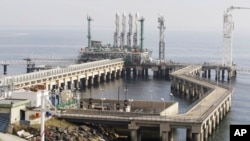ISTANBUL —
With the crisis continuing to deepen in Ukraine, concern is growing in neighboring Turkey about the economic fallout, but Ankara also sees opportunities.
Rising tensions between Ukraine and Russia are putting regional neighbor Turkey in an increasingly difficult position, having close political and economic ties with its Western allies and Moscow.
A visiting scholar of the Brussels based Carnegie Europe Institute, Sinan Ulgen, said there are significant risks to Turkey.
"The political economic risks are increasing, because the more the West hardens its position against Russia, the more it talks about introducing sanctions, the more difficult it will be for Turkey to keep a balanced act with Russia and the West," said Ulgen.
Even though Ankara criticized Moscow’s annexation of Crimea, it has not followed its Western allies and imposed economic sanctions on Russia, which is Turkey’s sixth-largest export market.
In a move seen as a goodwill gesture by Ankara to Moscow, the Turkish national air carrier Turkish Airlines announced the resumption of flights to Crimea. While observers say Ankara has tried to stay on the sidelines, Finans Bank chief economist Inan Demir warns that Turkey will not be able to escape the financial fallout from the crisis.
"If we see the tensions escalating further, then perhaps investors will take another look, and that will not be in the emerging markets' favor either. Even though there is some scope for capital outflows from Russia finding their way to Turkey, I think the broader emerging markets' sentiment will be weaker and that will have an indirect effect on Turkey as well," said Demir.
With Russia providing half of Turkey’s natural gas needs, much of which comes from a pipeline running through Ukraine, analysts warn the Turkish economy is vulnerable to disruption.
Energy also represents the potential for powerful leverage by Moscow against Ankara, like the rest of Europe, according to political consultant Atilla Yesilada of Istanbul-based Global Source Partners.
But Yesilada also says the Ukraine crisis could eventually be to Ankara’s advantage.
"One way to effectively discipline Russia is to create an alternative to Gazprom’s monopoly on most of European natural gas services, and that could be to accelerate building the Iraqi-Kurdish gas pipeline to Turkey, and then eventually to persuade Ankara help keep peace with Cyprus and to reconcile with Israel, so undersea pipelines can be built to Turkey," said Yesilada.
Cyprus and Israel have recently discovered large natural gas reserves and analysts say that could help Europe diversify its gas supply and lessen dependence on Russia. But aware of Europe’s talk of diversification, Gazprom is seeking to shore up its relations with Turkey, its second-largest customer after Germany.
This week Gazprom deputy head, Alexander Medvedev, held talks with Turkish energy minister Taner Yildiz to expand cooperation between the countries.
While the deepening crisis in Ukraine poses economic risks to Turkey in the short-term, analysts predict ultimately the crisis could be a catalyst leading to Ankara’s achieving a key strategic goal of establishing itself as a regional energy hub.
Rising tensions between Ukraine and Russia are putting regional neighbor Turkey in an increasingly difficult position, having close political and economic ties with its Western allies and Moscow.
A visiting scholar of the Brussels based Carnegie Europe Institute, Sinan Ulgen, said there are significant risks to Turkey.
"The political economic risks are increasing, because the more the West hardens its position against Russia, the more it talks about introducing sanctions, the more difficult it will be for Turkey to keep a balanced act with Russia and the West," said Ulgen.
Even though Ankara criticized Moscow’s annexation of Crimea, it has not followed its Western allies and imposed economic sanctions on Russia, which is Turkey’s sixth-largest export market.
In a move seen as a goodwill gesture by Ankara to Moscow, the Turkish national air carrier Turkish Airlines announced the resumption of flights to Crimea. While observers say Ankara has tried to stay on the sidelines, Finans Bank chief economist Inan Demir warns that Turkey will not be able to escape the financial fallout from the crisis.
"If we see the tensions escalating further, then perhaps investors will take another look, and that will not be in the emerging markets' favor either. Even though there is some scope for capital outflows from Russia finding their way to Turkey, I think the broader emerging markets' sentiment will be weaker and that will have an indirect effect on Turkey as well," said Demir.
With Russia providing half of Turkey’s natural gas needs, much of which comes from a pipeline running through Ukraine, analysts warn the Turkish economy is vulnerable to disruption.
Energy also represents the potential for powerful leverage by Moscow against Ankara, like the rest of Europe, according to political consultant Atilla Yesilada of Istanbul-based Global Source Partners.
But Yesilada also says the Ukraine crisis could eventually be to Ankara’s advantage.
"One way to effectively discipline Russia is to create an alternative to Gazprom’s monopoly on most of European natural gas services, and that could be to accelerate building the Iraqi-Kurdish gas pipeline to Turkey, and then eventually to persuade Ankara help keep peace with Cyprus and to reconcile with Israel, so undersea pipelines can be built to Turkey," said Yesilada.
Cyprus and Israel have recently discovered large natural gas reserves and analysts say that could help Europe diversify its gas supply and lessen dependence on Russia. But aware of Europe’s talk of diversification, Gazprom is seeking to shore up its relations with Turkey, its second-largest customer after Germany.
This week Gazprom deputy head, Alexander Medvedev, held talks with Turkish energy minister Taner Yildiz to expand cooperation between the countries.
While the deepening crisis in Ukraine poses economic risks to Turkey in the short-term, analysts predict ultimately the crisis could be a catalyst leading to Ankara’s achieving a key strategic goal of establishing itself as a regional energy hub.




